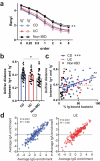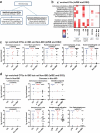Dynamic immunoglobulin responses to gut bacteria during inflammatory bowel disease
- PMID: 31203722
- PMCID: V体育安卓版 - PMC7524373
- DOI: 10.1080/19490976.2019.1626683
Dynamic immunoglobulin responses to gut bacteria during inflammatory bowel disease
Abstract
Aberrant immune responses against gut microbiota are thought to be key drivers of inflammatory bowel disease (IBD) pathogenesis. However, the extent and targets of immunoglobulin (Ig) A versus IgG responses to gut bacteria in IBD and its association with IBD severity is not well understood. Here, we address this by analyzing fecal samples from Crohn's disease (CD), ulcerative colitis (UC), and Non-IBD patients by flow cytometry for the frequency of bacteria that were endogenously bound with IgA and/or IgG. Assessment of IBD patients from two geographically distinct cohorts revealed increased percentages of IgA- and IgG-bound fecal bacteria compared to non-IBD controls. Notably, the two major subsets of IBD showed distinct patterns of Ig-bound bacteria, with CD activity associated with increases in both IgA and IgG-bound bacteria, whereas UC activity correlated only with increases in IgG-bound bacteria. Analysis of the flow sorted Ig-bound bacterial repertoire by 16S rDNA sequencing revealed taxa that were Ig-bound specifically in IBD. Notably, this included bacteria that are also thought to reside in the oral pharynx, including Gemella, Peptostreptococcus, and Streptococcus species. These data show that the pattern of IgA and IgG binding to fecal bacteria is distinct in UC and CD VSports手机版. In addition, the frequency of Ig-bound fecal bacteria may have potential as a non-invasive biomarker for disease activity. Finally, our results support the hypothesis that immune responses to oral pharyngeal bacteria may play an important role in the pathogenesis of IBD. .
Keywords: IgA; IgG; Inflammatory bowel disease; gut bacteria; immunoglobulin A; microbiota V体育安卓版. .
"V体育官网" Conflict of interest statement
No conflicts of interest to report.
Figures






References
VSports最新版本 - Publication types
- V体育平台登录 - Actions
MeSH terms
- "V体育2025版" Actions
- Actions (VSports最新版本)
- "VSports注册入口" Actions
- VSports - Actions
- "VSports手机版" Actions
- Actions (VSports)
- Actions (V体育官网入口)
"VSports注册入口" Substances
- "VSports注册入口" Actions
- Actions (V体育官网)
- Actions (VSports app下载)
Grants and funding
LinkOut - more resources
Full Text Sources
Medical
Miscellaneous
